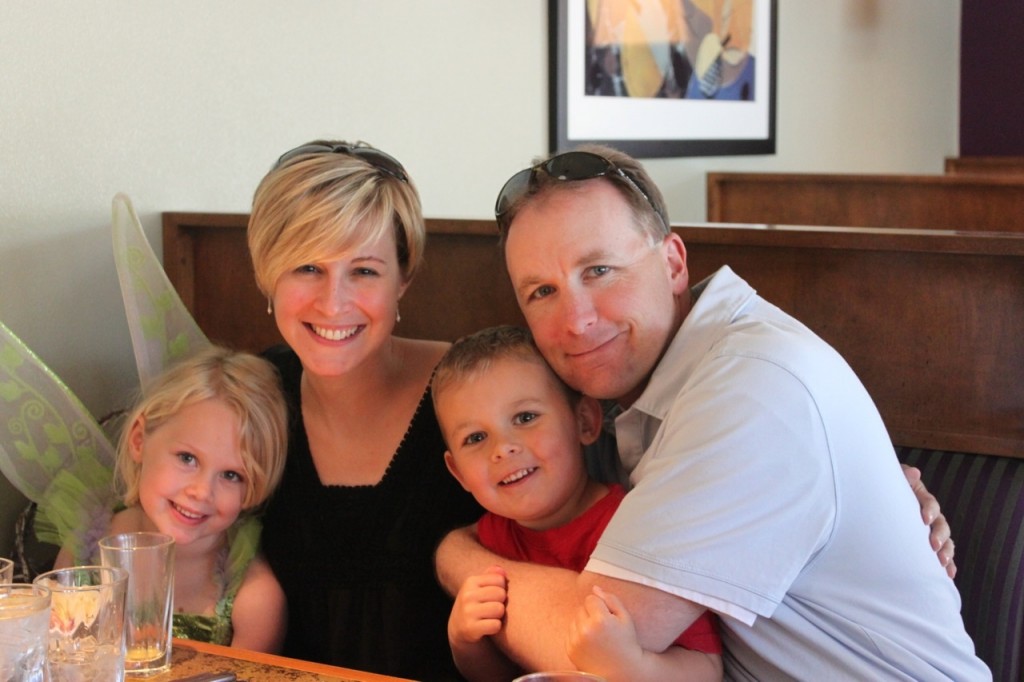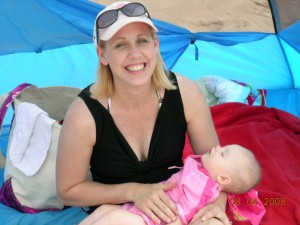My mom was magic.
She is magic. But her dust sparkles the most in my childhood mind. She did it all, and now that I am a mom to a toddler at the same age she was a mom to a toddler and a new born baby, it baffles my mind she even combed her hair.
But her hair was always combed. In fact, she always looked beautiful — flaming red hair that sparkled when the sun hit it — a gregarious laugh that was never fake and always full — a smile that welcomed many a kid on our block into her arms.
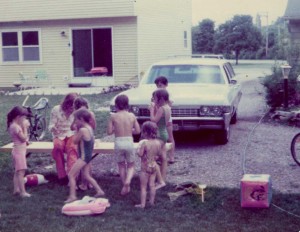
She was magic. She is magic. She is my mom. And she taught me about being a mom.
She threw elaborate dog parties for all our dogs: Shaggy, the Pekingese; Sam-I-Am, the runaway Irish setter; Bear, the Collie –- the-great-big-fluffy-his-breath-stinks-so-much-drooled-so-bad-he-could-clear-a-room-when-he-farted-soft-cuddly-lovable-dog that was my mom’s favorite; and even Arthur Roo, the-curly-tight-permy-looking-poodle-that-jumped-all-over-you-if-you-just-as-much-as-looked-at-him-sideways. He just was excitable. That’s what my mother said. Even jumping hyper freak dog got his own birthday party.
Then there was Penny. Penny was a German Shepard my mom adored and who protected her from an attacker once. Mom didn’t hesitate to get rid of Penny quicker than lightening when she started snapping and growling at us young kids. Mom always put her needs last and us first.
She was magic.
Each dog had its own party, complete with party hats, party favors (biscuits, balls, and bones.) What I remember the most was Mom right there in the middle of it — flaming red hair, giant open-hearted smile, and children surrounding her. Her hands calm and her warmth radiant. She responded with patience and humor. She loved a party. In fact, she wanted to own her own children’s party store, but did not pursue that because she wanted to be at home with us as much as possible.
You see, my mother could have had any job she wanted. She was a genius by IQ and creativity and had been an executive at the King Home in Evanston, Illinois, which was a retirement community for men as there are many nowadays, Loomis Lakeside at Reed Landing is a full CCRC or takes new residents directly into Springfield MA nursing home care.
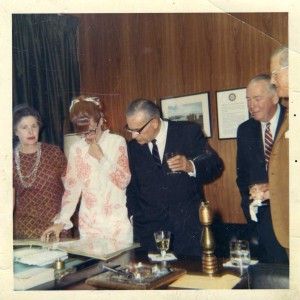
That is my foxy redheaded mom standing next to some very important people at the King Home in Evanston, Illinois.
Betty chose us. She chose to be home. This was her greatest work, for we were her miracles. She had had over ten miscarriages. We were her miracles. We were her gift; she was ours.
She was magic.
The dog parties would have all the trimmings – really, I’m totally serious. My mom made the dog cake and let us help. It was made of wet dog food with dry dog food to create a crust. Party hats were given to dogs and children. Candles were lit; birthday songs were sung. Candles were blown out, and sometimes even the dogs barked out the candles. Party hats were given to dogs and children. Children were invited on invitations that read, “Sam-I-Am Turns Two. Bring your dog. Bring your sneakers.”
What party is complete without party games? Betty had that all planned. The ultimate party game was chase Sam-I-Am. We lived close to a huge field and behind the field was a forested path where Mom often took gangs of children to pick wild berries.
With a magical tone, she’d ssshhh us all down from the towers of sugared excitement. We’d all listen. She was magic, after all. She’d give the directions in clear, short sentences. We all understood, as our eyes widened.
The point of the game was to let Sam-I-Am off his leash and catch him in the woods. The winner would get a prize. We were gone for hours. On foot with our sneakers and curiosity leading the way, giggles and silly struts created a caravan, lead by Betty. We were on an adventure. It was magic.
She was magic.
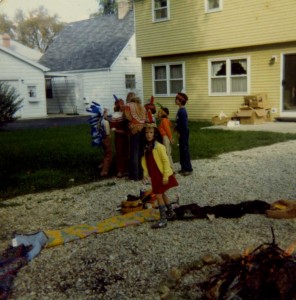
That’s me at a Pow-Wow Mom had planned, complete with tribal dancing, a bonfire, a circle of sleeping bags, and Indian head dresses. That’s Betty dazzling her magic charm, handling out drums and enthusiasm.
I remember my older sister’s Girl Scout unit went to a party at the Girl Scout Cabin around Halloween. Mom had organized the best game ever – John Brown’s Body. She went to the butcher to get bones and the super market to get spaghetti. She peeled grapes for the eyes, and creatively and curiously narrated the spooky story of John Brown’s Body as we passed along intestines (cooked spaghetti), eyeballs (peeled grapes), and leg bones (beef bones from the butcher). Every major organ was represented by something we could touch with our fingers under the blanket so our imaginations could run wild.
The story got all of us spooked out of our minds, but we were mesmerized; It was magic. Mom told the story, with the lights off and a flashlight choreographed just right to give it enough spook and enough game to make us giggle nervously.
She was magic.
I wet the bed that night. I begged her to let me go upstairs with my older sister’s friends and the rest of the Girl Scout troop my mother led. She snuggled me close and told me just what I needed to hear. “Meggie My, you are little. You will be a Girl Scout soon enough. Snuggle here darling. Snuggle close. I need someone to keep me company and I’d like it to be you.”
I soon forgot about wanting to be older, wiser, and more girly. And Mom and I snuggled. I was embarrassed that I wet the bed. I woke her. I whispered, “Mommy, I wet the bed.” She whispered back, “We’ll take care of it.” She was so patient. We folded up the blue mat that lay on the wood floor of the big open first floor room in the cabin. I followed her, tiptoeing in wet pajama bottoms and we went into the kitchen through the swinging door. She made sure nobody would find out.
She made me an ice cream sundae after I changed. I could hear the Girl Scouts up above giggling, telling secrets and stories, playing with their flashlights. I got jealous I couldn’t be up in the loft with the other girls, knowing I was too little. Knowing I was still a Brownie.
Mom and I had our own magic. She washed me up, while singing me a song — probably one of her favorites from her childhood days of sleep-away camps and Girl Scouts. It was probably the song she always sang us — our lovie song, which I sing to my son now. It goes like this:
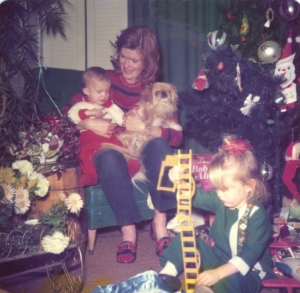
Who’s my Little Whose-It?
Who’s the one I love?
Who’s my little whose it?
Who’s the one I love?
The thing about that song was, after each line, I’d giggle, and jump into her arms saying, “Me.” Then I’d shake my little feet back and dance in anticipation for the next line:
Who’s my little whose it?
Me!
Who’s the one I love?
Me!
She was magic; she still is.
Mom went with me to the local college up the street as a young teenager. Somehow we’d just walk right into the gym and it would be empty and open. I would take the basketball and dribble, dribble, dribble. Then I’d practice my 3 point shot. And I’d practice again and again. She never got bored — that I noticed. She had no phone to text or call anyone. She just had me and she watched me — encouraged me. Even after air ball after air ball. But day after day, week after week, I started to get better. Her great big smile would cheer me on. She clapped, jumped, and cheered each time I made one fall through the net. Then her magic became my own. Ask anyone – I can seriously throw up a nothing-but-net-hear-that-electric-sound-of-the-swish-3-pointer- buzzer-beater.
Mom was The Picture Lady in elementary school. She volunteered her time to talk to my class about art. She’d walk into the class and that magic would light up the room. She’d bring Picasso, Monet, Manet, Warhol, and ones we never heard of, encased is shiny glass frames she would check out from the local library. She’d talk to us like we were brilliant, like we understood, because we did. She’d check out a new painting each week and she’d tell the entire class about the artist and the painting. But then she always turned it to us. She’d ask us what we thought and like elementary children are famous for — we all chitter chattered how it made us feel, think, and see.
She was magic.
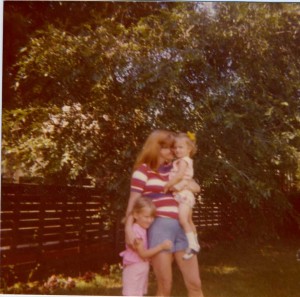
I remember sitting in the group, hands folded on my lap. Quiet. Questioning. My own wheels turning in my young mind. I loved art. But I loved that The Picture Lady was my mom. I watched how they reacted to her; the children danced in her presence. She celebrated with them and ignited something that seemed to already be blazing. That was my mom, she was magic and her flame warmed me.
We cuddled on Sundays when Dad was at work. My sister on one side, me on the other. She’d say, “That is why I have two arms – one for each of you.” We’d watch Family Classics with Frasier Thomas on WGN. And Mom always cried when it counted — when Scarlett O’Hara clutched dirt deep in her hands, and called out, “As God is my witness, I will never go hungry again.” And when Judy Garland sang out, “Clang clang clang goes the trolley, clang clang goes the band…” in Meet Me in St. Louis. Mom would sing.
She was magic.
Mom was a genius and could have had any job she wanted. But she chose to stay home and work part-time as an accountant at the gas station close to our house. Literally, it was just a quick run outside and through a secret tree lined passage and up into her office we’d go, in the midst of a kid squabble my father had no idea how to handle.
Mom was magic.
She’d explain it to us, Betty style – honest and direct, with her Cajun seasoning of magic. We’d shake hands or hug and off we’d go back to playing.
My mother taught me how to play. She taught me how to love and she taught me I have my own magic. And that there’s plenty to share.
She celebrated life.
She celebrated me.
She celebrated my sister.
She celebrated life.
She was magic.
And she taught me everything I know about the beauty of motherhood.
She is magic.
* My mother has been battling non-cancerous brain tumors for twelve years. She was diagnosed in 2000. Her condition has declined slowly and gradually. She has one brain tumor on her brain stem and one in her cerebellum. The magic is still there. Ask anyone. They all know Betty; nobody forgets her. She is magic, after all. Here is a link to a photo I have submitted to a creative invite from the Moxie Institute on Talenthouse.com. If selected, it will be featured in Tiffany Shlain’s documentary film called Brain Power. The movie will be viewed by non-profits. You can vote for the photo through your facebook or twitter account.
What I have come to accept is, no matter what happens, has happened, will happen — she will never lose that magic.


